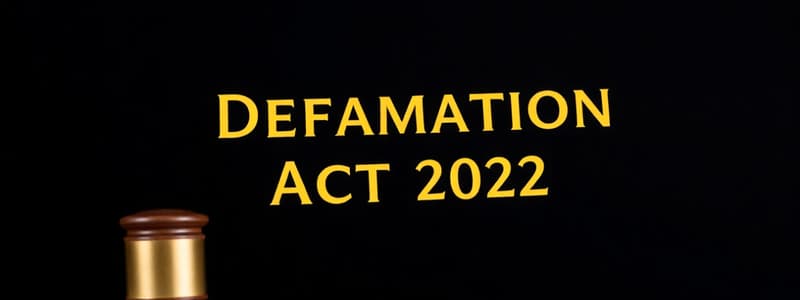Podcast
Questions and Answers
According to the Defamation and Malicious Publication (Scotland) Act 2021, which of the following is considered a 'statement'?
According to the Defamation and Malicious Publication (Scotland) Act 2021, which of the following is considered a 'statement'?
- Words, pictures, visual images, gestures, or any other method of signifying meaning (correct)
- Only written documents and formally recorded gestures
- Words, pictures, or visual images only
- Only spoken or written words
Under Section 1 of the Defamation and Malicious Publication (Scotland) Act 2021, what condition must be met for a right to bring defamation proceedings to accrue?
Under Section 1 of the Defamation and Malicious Publication (Scotland) Act 2021, what condition must be met for a right to bring defamation proceedings to accrue?
- The defamatory statement must be published to a person other than the person being defamed and must cause serious harm to their reputation. (correct)
- The person making the defamatory statement must have intended to cause harm.
- The defamatory statement must be made directly to the person being defamed.
- The defamatory statement must be proven to be factually incorrect.
In the context of defamation law, what is the significance of the case Sim v Stretch [1936]?
In the context of defamation law, what is the significance of the case Sim v Stretch [1936]?
- It pertains to statements made by public authorities.
- It outlines the defenses available in defamation cases.
- It defines a defamatory statement as one that causes harm to a person’s reputation, lowering it in the estimation of ordinary persons. (correct)
- It established the threshold for what constitutes 'serious harm' in defamation cases.
According to Section 3 of the Defamation and Malicious Publication (Scotland) Act 2021, under what condition is a person NOT considered the editor of a defamatory statement in electronic form?
According to Section 3 of the Defamation and Malicious Publication (Scotland) Act 2021, under what condition is a person NOT considered the editor of a defamatory statement in electronic form?
Under Section 2 of the Defamation and Malicious Publication (Scotland) Act 2021, can a public authority bring defamation proceedings?
Under Section 2 of the Defamation and Malicious Publication (Scotland) Act 2021, can a public authority bring defamation proceedings?
Which of the following scenarios is least likely to be considered defamatory?
Which of the following scenarios is least likely to be considered defamatory?
Under Section 5 of the Defamation and Malicious Publication (Scotland) Act 2021, what must a defender show to successfully use 'truth' as a defense in defamation proceedings?
Under Section 5 of the Defamation and Malicious Publication (Scotland) Act 2021, what must a defender show to successfully use 'truth' as a defense in defamation proceedings?
What key element must a defender demonstrate to utilize the 'Public Interest' defense under Section 8 of the Defamation and Malicious Publication (Scotland) Act 2021?
What key element must a defender demonstrate to utilize the 'Public Interest' defense under Section 8 of the Defamation and Malicious Publication (Scotland) Act 2021?
Under Section 7 of the Defamation and Malicious Publication (Scotland) Act 2021, which of the following is NOT a condition for the 'Honest Opinion' defense?
Under Section 7 of the Defamation and Malicious Publication (Scotland) Act 2021, which of the following is NOT a condition for the 'Honest Opinion' defense?
Which of the following types of statements are typically considered to have 'Privilege' against defamation claims?
Which of the following types of statements are typically considered to have 'Privilege' against defamation claims?
What key factor distinguishes 'Qualified Privilege' from absolute privilege in defamation law?
What key factor distinguishes 'Qualified Privilege' from absolute privilege in defamation law?
Under the Defamation and Malicious Publication (Scotland) Act 2021, what is the effect of an 'offer to make amends' if it is accepted by the aggrieved party?
Under the Defamation and Malicious Publication (Scotland) Act 2021, what is the effect of an 'offer to make amends' if it is accepted by the aggrieved party?
Which of the following is an example of a 'malicious publication' as defined under the Defamation and Malicious Publication (Scotland) Act 2021?
Which of the following is an example of a 'malicious publication' as defined under the Defamation and Malicious Publication (Scotland) Act 2021?
In the case of Ashton Properties (Glasgow) Ltd v Unite The Union [2024], what was the central issue?
In the case of Ashton Properties (Glasgow) Ltd v Unite The Union [2024], what was the central issue?
What does SLAPP stand for in the context of defamation law?
What does SLAPP stand for in the context of defamation law?
According to the lecture, the Economic Crime and Corporate Transparency Act 2023 ss194-195 addresses SLAPPs in which jurisdiction?
According to the lecture, the Economic Crime and Corporate Transparency Act 2023 ss194-195 addresses SLAPPs in which jurisdiction?
What is the typical time limit for bringing a defamation case, according to the material?
What is the typical time limit for bringing a defamation case, according to the material?
If a statement is made that contains multiple imputations, how does that affect a defense of truth?
If a statement is made that contains multiple imputations, how does that affect a defense of truth?
A company's reputation is harmed by a defamatory statement. According to s1(3) of the Defamation and Malicious Publication (Scotland) Act, 2021, what additional factor must be proven for the harm to be considered 'serious harm'?
A company's reputation is harmed by a defamatory statement. According to s1(3) of the Defamation and Malicious Publication (Scotland) Act, 2021, what additional factor must be proven for the harm to be considered 'serious harm'?
A blogger posts a review of a local restaurant, criticizing the food and service. The restaurant owner sues for defamation. Which of the following factors would be MOST important in determining whether the blogger can successfully use the defense of ‘honest opinion’?
A blogger posts a review of a local restaurant, criticizing the food and service. The restaurant owner sues for defamation. Which of the following factors would be MOST important in determining whether the blogger can successfully use the defense of ‘honest opinion’?
A journalist publishes an article containing false information about a politician's financial dealings. The journalist claims they believed the information was accurate based on a confidential source. Which defense might the journalist attempt to use, and what would they need to demonstrate for it to succeed?
A journalist publishes an article containing false information about a politician's financial dealings. The journalist claims they believed the information was accurate based on a confidential source. Which defense might the journalist attempt to use, and what would they need to demonstrate for it to succeed?
What situation could potentially allow a court to infer facts about the severity of statements in a defamation case, according to the case of Lachaux v Independent Print Ltd & Anor?
What situation could potentially allow a court to infer facts about the severity of statements in a defamation case, according to the case of Lachaux v Independent Print Ltd & Anor?
Which of the following scenarios might weaken a defense of ‘qualified privilege’ in a defamation case?
Which of the following scenarios might weaken a defense of ‘qualified privilege’ in a defamation case?
According to the lecture, which case provides insight into the meaning of ‘serious harm’ when used in a courtroom?
According to the lecture, which case provides insight into the meaning of ‘serious harm’ when used in a courtroom?
Flashcards
What is defamation?
What is defamation?
A statement that harms a person's reputation, lowering their standing in the eyes of ordinary people.
What constitutes a 'statement'?
What constitutes a 'statement'?
According to s36(b), this includes words, pictures, visual images, gestures, or any method of conveying meaning.
When can defamation proceedings be initiated?
When can defamation proceedings be initiated?
A right to bring defamation proceedings only occurs if the statement is published to someone other than the person being defamed, and it causes (or is likely to cause) serious harm to their reputation.
What is 'serious harm' for businesses?
What is 'serious harm' for businesses?
Signup and view all the flashcards
Who is the 'author' of a statement?
Who is the 'author' of a statement?
Signup and view all the flashcards
Who cannot bring defamation proceedings?
Who cannot bring defamation proceedings?
Signup and view all the flashcards
What topics of statements are likely defamatory?
What topics of statements are likely defamatory?
Signup and view all the flashcards
What is the Truth Defence?
What is the Truth Defence?
Signup and view all the flashcards
What is the public interest defence?
What is the public interest defence?
Signup and view all the flashcards
Honest Opinion defence?
Honest Opinion defence?
Signup and view all the flashcards
What communications are protected by Privilege?
What communications are protected by Privilege?
Signup and view all the flashcards
What is Qualified Privilege?
What is Qualified Privilege?
Signup and view all the flashcards
What is offer to make amends?
What is offer to make amends?
Signup and view all the flashcards
What does SLAPP stand for?
What does SLAPP stand for?
Signup and view all the flashcards
Study Notes
- Good names in people are valuable.
- Names are vulnerable to theft from others
- "Defamation and Malicious Publication (Scotland) Act 2021" began August 8th 2022.
- It codifies defamation law and provides explanatory notes.
- A statement is defamatory if it harms a person's reputation, lowering it in the eyes of ordinary people.
- This is illustrated in Sim v Stretch [1936] 2 All ER 1237, HL.
- Defamation can occur through libel or slander.
- A "statement" includes words, pictures, visual images, gestures, or any method of signifying meaning, including innuendo.
- Section 1 of the act applies to defamatory statements made/published by a person (A) about another person (B).
- Defamation proceedings can be initiated if A publishes the statement to someone other than B and the publication has caused or is likely to cause serious harm to B's reputation.
- "Serious harm" is determined using the ordinary meaning described in Sobrinho v Impresa Publishing SA [2016] EWHC 66 (QB).
- In Lachaux v Independent Print Ltd & Anor [2019] UKSC 27, it was deemed to be a question of fact with facts inferred from circumstances like the gravity of the statements.
- Apologies can also influence "serious harm" as seen in Cooke & Anor v MGN Ltd & Anor [2014] EWHC 2831 (QB).
- The concept of "serious harm" can be influenced by a small publication, or a claimant's position as illustrated in Turley v Unite the Union & Anor [2019] EWHC 3547 (QB).
- Serious harm to a business trading for profit only occurs if it causes or is likely to cause serious financial loss.
- Section 3 outlines who is responsible for a defamatory statement and an "author" is the person from whom the defamatory statement originated,.
- In electronic communications, a person isn't considered an editor or responsible if their involvement is limited to publishing the statement without altering it or marking interest in a non-altering way, and if this doesn't increase the harm caused.
- Public Authories may not bring defamation proceedings.
- Public authorities include any institution of central/local government
- This includes non-natural persons owned or controlled by them, a court, a tribunal, any office not falling within the first categories.
- Nothing in the act prevents defamation proceedings in a personal capacity, distinct from their official role.
- Defamatory content may include:
- Criminality such as in Monson v Tussauds Ltd [1894] 1 QB 671 and Harkness v Daily Record Ltd 1924 SLT 759.
- Dishonesty
- Financial unsoundness such as in Russell v Stubbs Ltd [1913] 2 KB 20.
- Professional, vocational, or business competence, illustrated in Mackellar v Duke of Sutherland (1859) 21 D 222 and McRostie v Ironside (1849) 12 D 74.
- Disease.
Defences
- Truth is a valid defense if the defender can show the statement's implied meaning is true or substantially true (replaces Veritas).
- Even if a statement conveys multiple imputations, the defence doesn't fail if some imputations are true/substantially true, and the untrue imputations haven't caused serious harm to the pursuer's reputation.
- Public Interest replaces the Reynolds Defence (Reynolds v Times Newspapers Ltd [2001] 2 AC 127 (HL)).
- A defence is made if there is reasonable belief that the defender published a matter of public interest.
- Honest Opinion replaces fair comment and is a defence to defamation proceedings if specific conditions are met.
- The statement must be an opinion.
- The statement should indicates the evidence it's based on.
- An honest person could have held that opinion.
- However, it fails where the defender didn't genuinely hold the opinion.
- Rixa is a defence
- Statements made in the House of Commons, House of Lords, and the Scottish Parliament are protected under Privilege.
- Statements made in judicial proceedings and reports of judicial proceedings (s9) are also covered.
- Qualified Privilege exists if A has a moral, social, or legal duty to make a statement, and B has an interest in it.
- This includes references, complaints, reports about parliamentary business, and peer-reviewed academic work.
- This does not apply if there is Malice.
- Sections 13-17 outline the "Offer to make amends" defence.
- The defender can offer to correct a statement, apologize, and publish the correction or apology.
- If the offer is accepted, defamation proceedings are barred, though the offer can be enforced.
- If rejected, a defence is provided if A didn't know the statement was about B, or that it was false and defamed B.
Malicious Publications
- Statements causing harm to business interests(s21), about titles to land (s22) and assets (s23) are all malicious publications.
The Case: Ashton Properties (Glasgow) Ltd v Unite The Union [2024] SC GLA 37
- This case concerns the meaning of two tweets about workers' wages that are being reduced to MW.
- The defence in question is whether there was truth in the message's content or that it was an honest opionion.
Strategic Lawsuits Against Public Participation (SLAPPs)
- Economic Crime and Corporate Transparency Act 2023 ss194-195 (England and Wales) are relevant to SLAPPs.
- Solicitors Regulation Authority Warning Notice and Government rules out immediate anti-SLAPP legislation.
- See https://www.sra.org.uk/solicitors/guidance/slapps-warning-notice/ and https://www.lawgazette.co.uk/law/government-rules-out-immediate-slapp-legislation/5121610.article
- S19 governs actions against a person not domiciled in the UK.
- Per S32, a case must usually be brought within one year of the first publication.
Studying That Suits You
Use AI to generate personalized quizzes and flashcards to suit your learning preferences.




